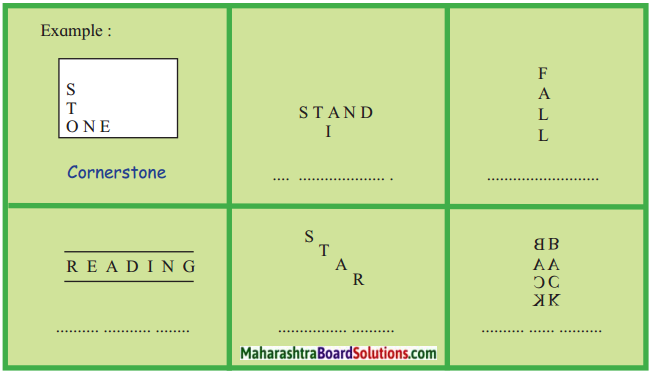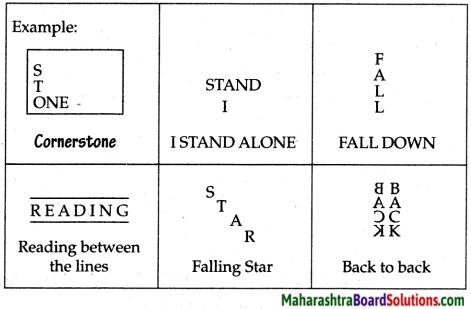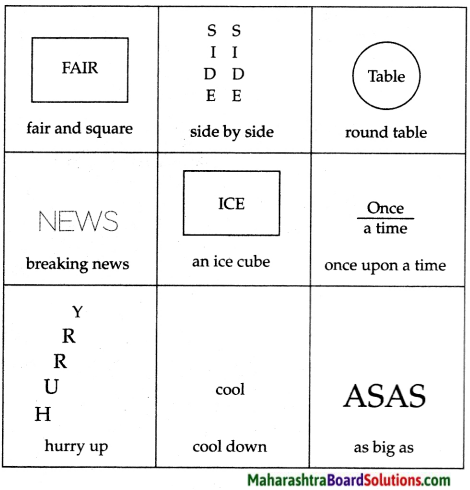Balbharti Maharashtra State Board Class 6 English Solutions Chapter 4.6 The Phantom Tollbooth Notes, Textbook Exercise Important Questions and Answers.
Std 6 English Lesson 4.6 The Phantom Tollbooth Question Answer Maharashtra Board
Class 6 English Chapter 4.6 The Phantom Tollbooth Textbook Questions and Answers
1. Read the passage and answer the following questions.
Question a.
Which book is introduced in the passage?
Answer:
The novel “The Phantom Tollbooth” is introduced in the passage.
![]()
Question b.
Where does the story take place?
Answer:
The story takes place in San Francisco in the United States.
Question c.
Who is the main character in the story?
Answer:
Milo, a young boy who lived in San Francisco in the States is the main character in the story
Question d.
Why is the tollbooth called a ‘Phantom’ Tollbooth?
Answer:
“Phantom” (A ghost) is a character we read about in comics. No one knows where he comes from. The same is applicable to the tollbooth. Both Phantom and the tollbooth have one thing in common: ‘their mysterious appearance’ and so the name “The Phantom Tollbooth”.
Question e.
When was the book written?
Answer:
The book was written more than 50 years ago.
![]()
Question f.
Who has written the book?
Answer:
The book has been written by Norman Juster.
2. List the various people and places mentioned in the passage. The places Milo visits and the people he meets have unusual names. Write the meanings of those names.
Question 1.
List the various people and places mentioned in the passage. The places Milo visits and the people he meets have unusual names. Write the meanings of those names.
Answer:
People he meets:
| Names | Meaning |
| 1. Rhyme and Reason | Purpose or explanation (usually used as a phrase: without any rhyme and reason) |
| 2. Lethargarians | People without energy and enthusiasm |
People he visits:
| Names | Meaning |
| 1. Land of expectations | Land filled with anticipation of things to come |
| 2. Kingdom of wisdom | A land which reflected experience, knowledge and judgment. |
| 3. Castles of air | An imaginary fortified building |
| 4. Doldrums | A place in a state of inactivity |
3. List the various things that the Lethargarians do or want to do. Can you sum up all of it in one word or phrase?
Question 1.
List the various things that the Lethargarians do or want to do. Can you sum up all of it in one word or phrase?
Answer:
Epitome of laziness
![]()
4. In the novel, the Lethargarians give a whole day’s timetable of their activities. Can you guess what it would be like? Use your own ideas and prepare their timetable.
Question 1.
In the novel, the Lethargarians give a whole day’s timetable of their activities. Can you guess what it would be like? Use your own ideas and prepare their timetable.
Answer:
Timetable of Lethargarians
| Time | Activities Scheduled |
| 6.15 a.m. – 8.15 a.m. | Daydreaming |
| 8.15 a.m. – 9.15 a.m. | Taking naps |
| 9.15 a.m. – 10.15 a.m. | Dawdle and delay |
| 10.15 a.m. – 11.15 a.m. | Bide their time |
| 11.15 a.m. – 1.15 p.m. | Linger and loiter |
| 1.15 p.m. – 2.15 p.m. | Put off for tomorrow what they could do today |
| 2.15 p.m. – 3.15 p.m. | Loaf and lounge |
| 3.15 p.m. – 4.15 p.m. | Dillydally |
| 4.15 p.m. – 8.15 p.m. | Complain about busy schedule |
| 8.15 p.m. – 10.15 p.m. | Complain again that there is almost no time for brooding, lagging plodding or procrastinating. |
| 10.15 p.m. | Retire for the day |
5. Try to write an interesting timetable for imaginary people or creatures.
Question 1.
Try to write an interesting timetable for imaginary people or creatures.
Answer:
Timetable of the Determinator alias “Team”
| Time | Activities Scheduled |
| 6.15 a.m. – 8.15 a.m. | Getting up and making a few resolutions |
| 8.15 a.m. -9.15 a.m. | Exercise |
| 9.15 a.m. -10.15 a.m. | Eat a healthy breakfast |
| 10.15 a.m. – 11.15 a.m. | Planning of immediate tasks |
| 11.15 a.m. – 1.00 p.m. | Execution of the task |
| 1.00 p.m.-2.00 p.m. | Lunch break |
| 2.00 p.m. – 3.00 p.m. | Afternoon siesta |
| 3.00 p.m. – 4.00 p.m. | Tea break |
| 4.00 p.m. – 8.15 p.m. | Continuation of the task |
| 8.15 p.m.-9.00 p.m. | Taking stock of the day’s activities |
| 9.00 p.m. -10.00 p.m. | Dinner |
| 10.00 pm | Retire for the day |
![]()
6. Activity.
Start a collection of new and interesting words. Write the words in coloured ink on cards of equal size and arrange them in alphabetical order. Try to use the words in your writing or conversation from time to time.
7. Discuss what makes the following sentences funny.
Question a.
Your wasted time will be refunded.
Answer:
We all know that time once lost is lost forever. The above lines from the lesson is funny because in the letter which was sent with the parcel along with other instructions, the above line too was included. This line is a continuation of the earlier part of the statement which said that results were not guaranteed and if not perfectly satisfied, your wasted time will be refunded. This impossible and improbable assurance makes it a funny statement.
Question b.
There was no highway attached to the booth.
Answer:
A highway is a main public road on which we find booths to make telephone calls or for toll collection. The tollbooth mentioned was erected by Milo. But there was no highway attached to the same. He wondered how a tollbooth could exist without a highway evoking laughter from the reader on the funny statement.
![]()
8. The following boxes represent a word or phrase through a special arrangement of letters. Guess the words.
Question a.
The following boxes represent a word or phrase through a special arrangement of letters. Guess the words.

Answer:

Question b.
Try to represent the words or phrases using such special graphic arrangement.
Answer:

9. Write a review of your favourite book.
Question 1.
Write a review of your favourite book. Use the following points:
- Title of the book
- Author/Authors
- The central idea or story
- The important characters
- Some special features of the book
- Why is it your favourite book?
Class 6 English Chapter 4.6 The Phantom Tollbooth Additional Important Questions and Answers
Reading Skills, Vocabulary and Grammar.
Question 1.
Complete the boxes with two nouns from the extract:
Answer:

Question 2.
What does the passage deal with?
Answer:
The passage deals with an extract from the novel “The Phantom Tollbooth” and a short review of the same.
![]()
Question 3.
Where did Milo find himself?
Answer:
Milo found himself speeding down a highway into an unknown territory.
Question 4.
Where did Milo’s journey begin from?
Answer:
Milo’s journey began from the land of expectations.
Question 5.
Where did Milo have many adventures?
Answer:
Milo had many adventures in the kingdom of wisdom.
Question 6.
Write any one adventure which Milo had in the kingdom of wisdom.
Answer:
Milo had to rescue the princesses Rhyme and Reason from castles of air.
![]()
Question 7.
Pick out a word from the passage which means:
a. an exciting and daring experience
b. huge fortified building
Answer:
a. adventure
b. castle
Question 8.
Give the adjective forms of:
Answer:
- successful: success
- school: scholastic
Question 9.
You must read the novel to find out. (Pick out the modal and state its function)
Answer:
- Modal: must
- Function: compulsion
![]()
Question 10.
Why should we read books?
Answer:
“Books are keys to wisdom’s treasure,
Books are roads to lands of pleasure”.
Books provide us with wisdom and it is also a pleasure time activity. It enhances our knowledge and helps to put our leisure time to good use. So we must read books. Let us pledge to “Read and Grow”.
Language Study.
Question 1.
Nothing really interested him. (State the word class of the underlined word)
Answer:
really – adverb
Question 2.
He couldn’t return the parcel. (Add a question tag)
Answer:
He couldn’t return the parcel, could he?
![]()
Question 3.
Results are not guaranteed. (Form a Wh- question to get the underlined part as the answer)
Answer:
What are not guaranteed?
Question 4.
It was a proper booth with windows and a roof and a coin box. (Pick out two Naming words/Nouns)
Answer:
Naming words/Noun windows; roof
Question 5.
Milo was not sure that this new game would turn out to be interesting. (Write the antonyms of the underlined word and rewrite the sentence)
Answer:
Milo was unsure whether this new game would turn out to be interesting.
Question 6.
He sat in his toy car. The part of the speech of the underlined word is pronoun/adjective.
Answer:
Adjective.
![]()
Question 7.
He had many adventures there. (Separate the subject and predicate)
Answer:
He – Subject
had many adventures there – Predicate
Question 8.
It is a fantasy. (Make it interrogative)
Answer:
Isn’t it a fantasy?
Question 9.
It has helped them to look at their school and studies in a new light. (Pick out the article)
Answer:
article – a
![]()
Question 10.
Provide anagrams for: was, but
Answer:
saw, tub
Question 11.
A Book Review:
Answer:
Gulliver’s Travels:
The book ‘Gulliver’s Travels’ by Jonathan Swift was first published in 1726.
The book is a collection of Lemuel Gulliver’s fascinating voyages all over the world. The Gulliver was a surgeon who travelled to different places from 1699 to 1715.
The book is divided into 4 parts, each part containing Gullievr’s experience in a different land.
- Voyage to Liliput.
- Voyage to Brobdingnag
- Voyage to Laputa
- Voyage to the country of Honyhnhnms
The kids love to read the story of Gulliver and his adventures in the six inches dwarf like Lilliputians. ‘Gulliver’s Travels’ is loved and read and re-read by children and adults since centuries.
The Phantom Tollbooth Summary in English
A classic of children’s literature, this book written by Norman Juster has an important message for children and it has also helped them to look at their school and studies with a fc** new insight, a new perspective.
Introduction:
The novel “The Phantom Tollbooth” (A book review) reviews the book written fifty years ago.
![]()
Glossary:
- admitted (v) – accepted/confessed
- intrigued (v) – aroused curiosity headed for
- genuine (adj) – truly what it is said to be
- precautionary (adj) – something done in advance
- cartographers (n) – experts in map-drawing
- depict (v) – represent in words or pictures
- regulations (n) – rules for control
- destination (n) – the place where one is headed for
- territory (n) – an area
- expectations (n) – things we regard as likely to happen
- reuse (v) – to use something again
- mission (n) – an important task
- in a new light (n) – in a new perspective leading to better understanding
Std 6 English Digest Other Chapters:
- Sleep, My Treasure Class 6 Question Answers
- The Story of Gautama’s Quest Class 6 Question Answers
- Mr Nobody Class 6 Question Answers
- A Mad Tea Party Class 6 Question Answers
- If I Can Stop One Heart From Breaking … Class 6 Question Answers
- The Phantom Tollbooth (A Book Review) Class 6 Question Answers
- The Sword in the Stone Class 6 Question Answers
- An Autumn Greeting Class 6 Question Answers